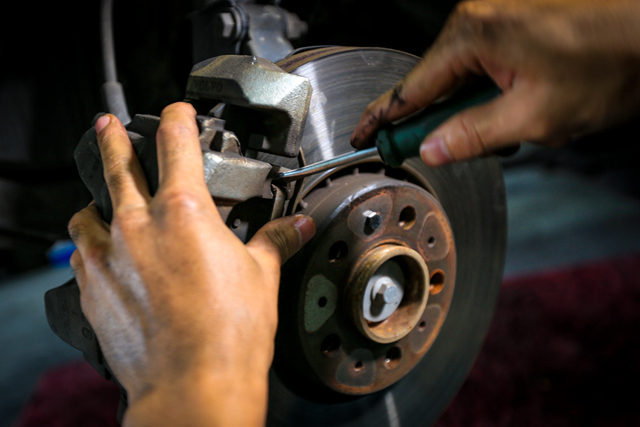During cold winter months, when there is an increased risk of snow and ice on the roads, it is more important than ever to ensure your brakes are properly maintained. Poor brake maintenance not only reduces the longevity and performance of your vehicle but also contributes to accidents and injuries, as well as road deaths due to collision.
The braking system of your vehicle is complex but surprisingly simple to maintain yourself. It is important you inspect and make necessary repairs to every component to ensure all parts are in working order. These parts include the Brake master cylinder and brake line, brake pads, calipers, and rotors.Your car should come with a recommended brake maintenance schedule in the manual; however, a good rule of thumb is to check your brake pads every 12,000 miles and replace your fluid every 25,000 miles. These estimates depend on your vehicle and driving style.
Here are five keys to brake maintenance that will help you stay safe on the roads:
The brake pads and rotors are the point of contact between your braking system and your tires. These elements deteriorate more easily than other components and require more frequent maintenance. Friction between the tires and the brake pads cause heat, and this heat wears down the brake pad. It is important to inspect the quality and depth of the pads to make sure there is sufficient resistance.
If you notice you need to depress your brake pedal further or smell a burning odor, or the distance it takes to stop increases drastically, it may be time to check and replace your brake pads and rotors. To check your brake pads and rotors at home, you need only remove the tire to assess the wear. If you notice wear or damage, replace them immediately, or take them to an auto shop for a disc brake repair service.

When you depress your brake pedal, pressure builds and is transferred through the brake fluid from the master cylinder, through the brake lines, and into the calipers, which transfer this pressure to the brake pads and rotors. Brake fluid is, therefore, extremely important because it is the messenger between you and your car’s braking system.
Unfortunately, brake fluid attracts moisture, which can be highly damaging to your braking system. Moisture in the brake fluid causes corrosion of the metal components of the brakes and reduces the boiling point of the fluid and affects the effectiveness of the brakes. Brake fluid should be checked and changed every 25,000 miles. A cloudy or milky quality indicates the fluid must be changed.
In addition to flushing the brake lines to change the brake fluid, it is also a good idea to bleed the brake line to remove excess air. When small amounts of air become trapped inside the brake line, it can reduce the efficacy of the braking system.
Bleeding the system removes the air from the brake line by depressing the brake pedal while adjusting the bleeder valve, and this should be done every 2– 3 years. This can be completed during a scheduled brake inspection service.
Sometimes it may be necessary to replace some elements in your braking system, and this can be a good opportunity to upgrade to higher performance or specialized components. Parts such as slotted disc brakes which are more heat resistant or switching to ceramic pads, which are quieter and produce less brake dust, are popular upgrades.Upgrading and replacing brake parts when necessary will improve the longevity and performance of your vehicle’s braking system.
One of the most effective ways to ensure the performance of your brakes is to look after them. There are many external factors that contribute to brake deterioration, such as:
Carrying too much weight
Unnecessary, late, or heavy braking
Wet weather
Avoiding these, and other situations that can affect your braking performance where possible, will keep your brakes performing better for longer and reduce the likelihood of brake failure related incidents.
Maintain all braking components and avoiding hazardous driving practices will guarantee your brakes function efficiently and keep your safety.
Contact: Mr. Alex
Phone: +8613751750509
E-mail: [email protected]
Whatsapp:+8613751750509
Add: 710 No. Sanyuanli Avenue. Baiyun District, Guangzhou,China
We chat
